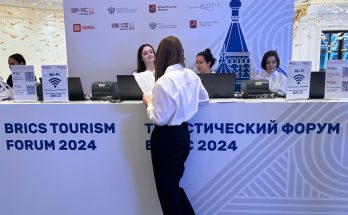 NEW YORK: Is SAARC in danger of becoming irrelevant? India’s External Affairs Minister Sushma Swaraj, for one, certainly thinks so, reinforcing widespread skepticism about the bleak future of the grouping which remains mired in India-Pakistan rivalry and Islamabad’s stonewalling of SAARC’s key initiatives.
NEW YORK: Is SAARC in danger of becoming irrelevant? India’s External Affairs Minister Sushma Swaraj, for one, certainly thinks so, reinforcing widespread skepticism about the bleak future of the grouping which remains mired in India-Pakistan rivalry and Islamabad’s stonewalling of SAARC’s key initiatives.
In her speech at an informal meeting of the foreign ministers of SAARC member nations on the sidelines of the UN General Assembly in New York, Mrs Swaraj voiced India’s disappointment with the failure of the eight-nation South Asian Association of Regional Cooperation (SAARC) to live up to its aims and objectives. The minister spelled out a host of roadblocks that continue to stall any significant progress made by the eight-nation grouping.
The four key points on regional development raised by the minister included the dismal poverty index that still plagues the South Asian region, the underutilised trade potential, the non-ratification by some member states of the SAARC Framework Agreement for Energy Cooperation, and the failure to finalise the proposed SAARC Motor Vehicle Agreement and SAARC Regional Railways Agreement.
Reaffirming India’s commitment to regional cooperation, the minister proposed India’s model of “collective efforts, inclusive growth,” as embodied in the mantra of “Sabka Saath, Sabka Vikas,” as a relevant template for enhancing regional cooperation. Mrs Swaraj alluded to the launch of the South Asian Satellite and progress in the South Asian University as examples of India’s unstinting commitment to regional integration.
Focus on terror
The Uri terror attack last year on an army base in Jammu and Kashmir, perpetrated by suspected Pakistani militants, had severely undermined the already strained relationship between India and Pakistan, leading to the boycott of the 19th SAARC Summit that was to be hosted by Pakistan. Bhutan, Afghanistan, Sri Lanka, Bangladesh and the Maldives had backed India, which eventually led to the sine die postponement of the SAARC summit.
On September 21, Mrs Swaraj underlined India’s viewpoint that “Regional prosperity, connectivity and cooperation can take place only in an atmosphere of peace and security. It, however, remains at serious risk in the region. The number of threats and incidents that endanger South Asia’s peace and stability are on the rise.” “It is necessary for our region’s survival that we eliminate the scourge of terrorism in all its forms, without any discrimination, and end the ecosystem of its support,” she added.
She called for the implementation of the decisions taken in the first two meetings of the High Level Group of Eminent Experts to Strengthen SAARC Anti-Terrorism Mechanism that was hosted by India.
Whither SAARC?
There was no clear indication regarding the SAARC summit, but the minister clarified that unless the high-level meetings translate into concrete actions on the ground, the relevance of the group would be lost. With India and Pakistan intensifying their war of words at the UNGA, the fate of SAARC, as of now, hangs in the balance. Amid increasing skepticism about the future of SAARC, India is trying to project the seven-nation BIMSTEC that comprises India, Bangladesh, Sri Lanka, Bhutan, Nepal, Thailand and Myanmar, as a viable alternative forum for enhanced regional cooperation.
(Pritha Mahanti contributed inputs for this article)
Author Profile
- India Writes Network (www.indiawrites.org) is an emerging think tank and a media-publishing company focused on international affairs & the India Story. Centre for Global India Insights is the research arm of India Writes Network. To subscribe to India and the World, write to editor@indiawrites.org. A venture of TGII Media Private Limited, a leading media, publishing and consultancy company, IWN has carved a niche for balanced and exhaustive reporting and analysis of international affairs. Eminent personalities, politicians, diplomats, authors, strategy gurus and news-makers have contributed to India Writes Network, as also “India and the World,” a magazine focused on global affairs.
Latest entries
 In ConversationJuly 26, 2024India-Italy defence collaboration can extend to third countries: Anil Wadhwa
In ConversationJuly 26, 2024India-Italy defence collaboration can extend to third countries: Anil Wadhwa In ConversationJuly 23, 2024Italy views India as a key partner in Indo-Pacific: Vani Rao
In ConversationJuly 23, 2024Italy views India as a key partner in Indo-Pacific: Vani Rao DiplomacyJune 29, 2024First BRICS unveils a roadmap for boosting tourism among emerging economies
DiplomacyJune 29, 2024First BRICS unveils a roadmap for boosting tourism among emerging economies India and the WorldJune 11, 2024On Day 1, Jaishankar focuses on resolving standoff with China
India and the WorldJune 11, 2024On Day 1, Jaishankar focuses on resolving standoff with China






